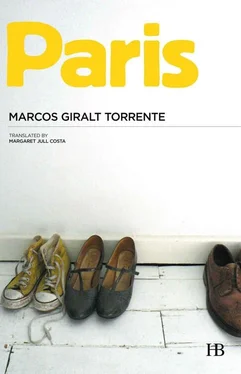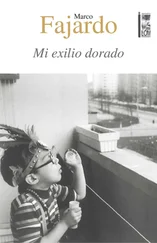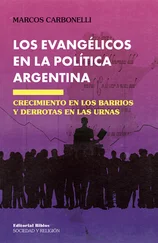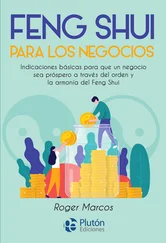Marcos Giralt Torrente - Paris
Здесь есть возможность читать онлайн «Marcos Giralt Torrente - Paris» весь текст электронной книги совершенно бесплатно (целиком полную версию без сокращений). В некоторых случаях можно слушать аудио, скачать через торрент в формате fb2 и присутствует краткое содержание. Год выпуска: 2014, ISBN: 2014, Издательство: Hispabooks, Жанр: Современная проза, на английском языке. Описание произведения, (предисловие) а так же отзывы посетителей доступны на портале библиотеки ЛибКат.
- Название:Paris
- Автор:
- Издательство:Hispabooks
- Жанр:
- Год:2014
- ISBN:9788494228452
- Рейтинг книги:5 / 5. Голосов: 1
-
Избранное:Добавить в избранное
- Отзывы:
-
Ваша оценка:
- 100
- 1
- 2
- 3
- 4
- 5
Paris: краткое содержание, описание и аннотация
Предлагаем к чтению аннотацию, описание, краткое содержание или предисловие (зависит от того, что написал сам автор книги «Paris»). Если вы не нашли необходимую информацию о книге — напишите в комментариях, мы постараемся отыскать её.
Paris — читать онлайн бесплатно полную книгу (весь текст) целиком
Ниже представлен текст книги, разбитый по страницам. Система сохранения места последней прочитанной страницы, позволяет с удобством читать онлайн бесплатно книгу «Paris», без необходимости каждый раз заново искать на чём Вы остановились. Поставьте закладку, и сможете в любой момент перейти на страницу, на которой закончили чтение.
Интервал:
Закладка:
XI
As regards my mother, I have only questions. I don’t know what hopes she had for that change in behavior or if she ever seriously believed in it; was it so very unusual that she could allow herself to believe he would not slide back into his old ways, or, on the contrary, could she not help but fear or foresee what would inevitably happen even if she denied it to herself moments later?
One thing is sure, once a certain degree of normality had been restored, regardless of whether or not she hoped it would last, my mother’s behavior changed, too. It was not a spectacular transformation, she didn’t suddenly become more cheerful, nor did she behave in any way that was substantially different from before. It was more subtle than that, almost imperceptible to anyone who was not, as I was, aware of every signal she gave off. During the early days following his return, not only did she avoid mentioning him when she was alone with me, she did her best to never even say his name, fearful, perhaps, of provoking any discussion for which she was not sure she could find the right answers. However, from the time my father began to stay at home, she grew far less cautious. Since there were fewer areas to avoid, fewer areas that, should my father come up in conversation, would have forced us to mention matters on which it was still too early to make any firm pronouncement, she allowed herself to be a little more spontaneous. If she came home and found he wasn’t there, instead of falling silent, as she would have done before, she would ask quite fearlessly where he was. If the three of us were sitting around the dining table joshing with my father and he suddenly got up and disappeared for a moment, she would go on joking, rather than stopping either out of fear or prudence. She went no further than that, though. She never referred to him without some specific reason or without relating it to some event in the day. After that morning in Burgos, when she had spoken to me for the first time about his idiosyncratic personality, she never returned to the subject. She didn’t offer me any new information, nor did she probe his motives for behaving as he did. Sometimes I would notice a melancholy look in her eyes when some incident aroused painful memories or when she could have done with an explanation, an explanation she never demanded. Day-today remarks were fine, but nothing that touched on the very heart of the problem — nothing about my father’s possible fears or hopes or misgivings, or what he was planning to do, or if he would stay with us permanently. She spoke only of the present, never of the past or the future.
Now I understand what a difficult balance her life must have been. On the one hand, there was me — ostensibly the most important person, the one for whose stability she was sacrificing everything else. It’s impossible to believe that anything she said or did then was spontaneous, or that she would have said or done the same thing had I not existed. She never allowed her feelings to run away with her. Her every gesture, her every action was rigorously assessed according to what she judged to be in my best interests. That’s why, while it was inconceivable that she would have told me about my father too soon, it was just as inconceivable that she would have tried to maintain that fiction when he was no longer in prison. She concealed the truth when she thought it best to exclude me and stopped doing so when she thought that deception could turn against her, and fell silent again when she realized that any comment she made about my father’s habits — habits I could now observe for myself — might prove to be mistaken or spark questions on my part which she didn’t know if she was able or willing to answer. On the other hand, there were her doubts, the fact that, in a way, this whole situation was built on shifting sand. After all, whether she liked it or not, she had to accept that a great deal had to be left to chance. There would have been no point in her drawing up any plans on her own if, later on, my father did the exact opposite. That was where the silence came from, that’s why she never mentioned him at first, and afterward only referred to him in safe, everyday situations, avoiding any confidences that could create a dangerous precedent between us.
This meant that I was unaware of his shortcomings until they were the past and not the present, when they had ceased to exist; and those that survived were different ones that, again, I didn’t notice until they, in turn, had been replaced. In this way, we passed through various phases, and I only discovered what the previous phase had meant once it already was the previous phase. In a way, my mother always seemed quite assured, accepting what was going on around her. She never appeared anxious or sad, or surprised by the pace of events. She seemed to accept them, and it was only when those events had passed that I understood what displeasure they had brought her. This also explains why I was always rather slow when it came to judging her state of mind.
Something similar happened with work. My father never said a word about finding a job, and I was completely unaware that normality could not be considered to have been fully restored for my mother until he took the first step toward seeking employment.
It happened one weekend when we were coming back from Toledo. We’d gone there to see an exhibition, which we weren’t able to do, in the end, because the palace where it was being held was closed in the afternoons, and we didn’t arrive until lunchtime. I don’t recall whose idea the trip was or what we talked about while it lasted. I vaguely remember that my father was very lively and full of jokes and that my mother, although she laughed at every humorous remark, gave off a certain air of unease, as if she distrusted that perfect family scene. After our failed attempt to visit the exhibition, we spent the rest of the day wandering aimlessly up and down the steep streets, and before picking up the car to go back to Madrid, by which time it was growing dark, we went into a bar right next to where we’d parked. It was a very cramped place, with a layer of sticky sawdust on the floor and, at the back, a few tables topped with faux-wood Formica. We chose to sit on the brightly colored padded stools at the bar and did so gladly, eager to rest our legs. We’d been there for some time, with the lone waiter occupied in cleaning the coffee machine, when, behind us, during a moment of silence, we heard a man’s voice addressing someone as “Professor.” We all turned around, and I was immediately conscious that while my response had been purely instinctive, there was a degree of urgency and alarm about my parents’ response. The scene that followed has remained engraved on my memory because it was the first time I’d actually seen anyone from my father’s secret world. There before us stood a man of about sixty, looking expectantly at my father, while my father scrutinized his face and gave absolutely no sign of recognition. After a few seconds, during which the stranger grew noticeably nervous, my father suddenly got down from his stool and shook the other man’s hand while the latter loudly clapped him on the back. Then, avoiding looking at us, although my mother and I were observing both men minutely, my father began to talk animatedly, undoing his initial silence and hesitation and the long moments it had taken him to react. I’ve forgotten how my father addressed the other man — in fact, I’m not even sure he used a name — but I do remember noticing a marked difference in attitude. They spoke warmly, like old friends, but the stranger seemed far less at ease, as if the title by which he had addressed my father embodied a spontaneous degree of respect. He wasn’t tense and was obviously enjoying the encounter, but equally obvious was the tenuous wall that interposed itself between them, a veil tinged with a sense of admiration or respect that my father did not share. The strangest thing, though, was that this submissive attitude in no way affected their evident intimacy. They joked, and asked about people I didn’t know, of whom I’d never heard him speak, and they did so using harsh-sounding nicknames. Apart from that and a few other banal remarks, I could understand almost nothing of what they said, with my father behaving as if my mother and I weren’t there at all. I understood the intention behind what they said, and certain general ideas, but nothing specific. It wasn’t that I couldn’t understand their voices or that they spoke too quickly, it was like listening to a language I knew only imperfectly and whose meaning I had to extrapolate from individual words and tone of voice. In this case, they were speaking the same language as us, but their conversation was so sprinkled with strange terminology and odd turns of phrase that I had the impression that these, rather than anything else, contained the real essence of each sentence. I now know that what I heard that afternoon was prison slang, but I didn’t know it then, and I remember feeling utterly perplexed. But this conversation did not last nearly as long as it has taken me to write about it. After a few moments of silent waiting, my mother said to my father that we would wait for him in the car and that he should hurry up. He turned briefly and said, “Yes, fine,” and then, making no attempt to introduce us or involve us in the conversation, he immediately turned back to his companion. Even more curious was the fact that this rudeness was not exclusive to him. I mean that the other man could at least have directed a look or a smile at us, some gesture that might indicate if not interest, then a willingness, however insincere, to keep us there. It was clear from the very start that he was aware of our presence and had not only guessed who we were but knew it for certain; however, just as he had not said a word to us or so much as glanced at us out of the corner of his eye, as we do when we meet an acquaintance accompanied by someone he or she has neglected to introduce, he made no attempt to prevent us from going, either. As if he were acting according to a code of conduct of which I knew nothing, he behaved exactly as my father did — after shooting us the very briefest of glances, he turned away and allowed us to leave.
Читать дальшеИнтервал:
Закладка:
Похожие книги на «Paris»
Представляем Вашему вниманию похожие книги на «Paris» списком для выбора. Мы отобрали схожую по названию и смыслу литературу в надежде предоставить читателям больше вариантов отыскать новые, интересные, ещё непрочитанные произведения.
Обсуждение, отзывы о книге «Paris» и просто собственные мнения читателей. Оставьте ваши комментарии, напишите, что Вы думаете о произведении, его смысле или главных героях. Укажите что конкретно понравилось, а что нет, и почему Вы так считаете.












